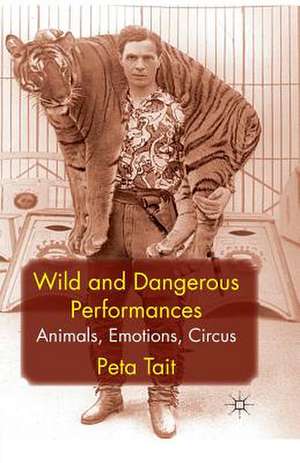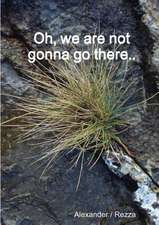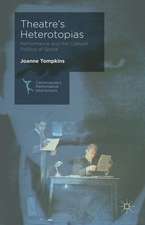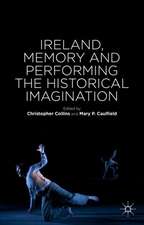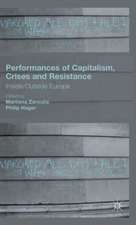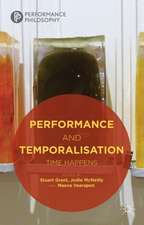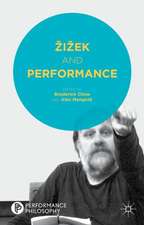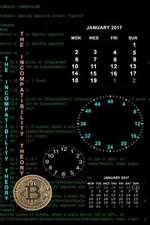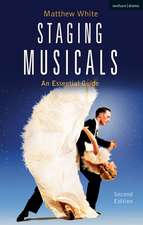Wild and Dangerous Performances: Animals, Emotions, Circus
Autor P. Taiten Limba Engleză Paperback – 2012
| Toate formatele și edițiile | Preț | Express |
|---|---|---|
| Paperback (1) | 382.36 lei 6-8 săpt. | |
| Palgrave Macmillan UK – 2012 | 382.36 lei 6-8 săpt. | |
| Hardback (1) | 390.63 lei 6-8 săpt. | |
| Palgrave Macmillan UK – 16 noi 2011 | 390.63 lei 6-8 săpt. |
Preț: 382.36 lei
Nou
Puncte Express: 574
Preț estimativ în valută:
73.17€ • 78.24$ • 61.00£
73.17€ • 78.24$ • 61.00£
Carte tipărită la comandă
Livrare economică 17 aprilie-01 mai
Preluare comenzi: 021 569.72.76
Specificații
ISBN-13: 9781349319619
ISBN-10: 1349319619
Pagini: 229
Ilustrații: X, 229 p.
Dimensiuni: 140 x 216 mm
Greutate: 0.28 kg
Ediția:1st ed. 2012
Editura: Palgrave Macmillan UK
Colecția Palgrave Macmillan
Locul publicării:London, United Kingdom
ISBN-10: 1349319619
Pagini: 229
Ilustrații: X, 229 p.
Dimensiuni: 140 x 216 mm
Greutate: 0.28 kg
Ediția:1st ed. 2012
Editura: Palgrave Macmillan UK
Colecția Palgrave Macmillan
Locul publicării:London, United Kingdom
Cuprins
Contents Acknowledgements List of Illustrations Introduction Calm Patience and Pyramid Poses The Lion Roars from a Pedestal Dancing Elephants in Skirts Leopard Around the Neck Born Free Again Sensing Emotion Works Cited Index
Recenzii
'Wild and Dangerous Performances is a highly readable account of the ways in which circus animals, particularly big cats (lions, tigers, leopards) and elephants, respond on an emotional level to, even develop an emotional rapport with, their trainers. Tait's new book provides a vivid perspective on developments in animal training in the nineteenth and twentieth century, while wryly noting the persistent gender stereotyping of both trainers and performing animals. This is an original, academically well grounded study, which valuably extends our knowledge of performance history.' - Professor Jim Davis, University of Warwick, UK
'Big cats on pedestals, humanised dancing elephants, live leopards as fur collars this book offers a compelling history of trained animal performers in fin de siècle and twentieth century circus. Tait provides far-reaching insights into the complexities of animals as performers and how we interpret emotion through their physical feats and performances.Commencing with the trained acts of the 1890s, Tait's meticulous research and theoretical framing redefines what live and cinematic circus animal performance means. Wild and Dangerous Performances: Animals, Emotions, Circus is an extraordinary feat a major contribution to circus history, performance and emotion studies, and to the contemporary field of animal studies.' - Dr Melissa Boyde, University of Wollongong and the Australian Animal Studies Group, Australia
'The meticulous historical research into circus acts that Peta Tait combines with careful analysis of the physical feats of animal performers, along with her deeply original theorizing about how emotion is evoked and presented to link human and non-human animals in performance, amounts to a new paradigm for engaging that seminal question of animal studies: 'Why look at animals?' With Wild and Dangerous Acts, Tait locates emotion at the very heart of the process through which meaning emerges when species meet. In so doing, she alters and expands our understanding of the imbrication of mimesis, subjectivity, and gender identity with notions of animality, wildness, and freedom.' - Una Chaudhuri, Acting Chair, Department of English, New York University, USA
'Both theoretically and historically rich, the book pushes interdisciplinary thinking on human-animal relations in modernity, on embodied emotions, and on animals and emotions to show how animal studies and performance studies productively intersect in affect studies... [a] densely argued, well-illustrated and important book...' - Kim Marra, Theatre Journal
'Big cats on pedestals, humanised dancing elephants, live leopards as fur collars this book offers a compelling history of trained animal performers in fin de siècle and twentieth century circus. Tait provides far-reaching insights into the complexities of animals as performers and how we interpret emotion through their physical feats and performances.Commencing with the trained acts of the 1890s, Tait's meticulous research and theoretical framing redefines what live and cinematic circus animal performance means. Wild and Dangerous Performances: Animals, Emotions, Circus is an extraordinary feat a major contribution to circus history, performance and emotion studies, and to the contemporary field of animal studies.' - Dr Melissa Boyde, University of Wollongong and the Australian Animal Studies Group, Australia
'The meticulous historical research into circus acts that Peta Tait combines with careful analysis of the physical feats of animal performers, along with her deeply original theorizing about how emotion is evoked and presented to link human and non-human animals in performance, amounts to a new paradigm for engaging that seminal question of animal studies: 'Why look at animals?' With Wild and Dangerous Acts, Tait locates emotion at the very heart of the process through which meaning emerges when species meet. In so doing, she alters and expands our understanding of the imbrication of mimesis, subjectivity, and gender identity with notions of animality, wildness, and freedom.' - Una Chaudhuri, Acting Chair, Department of English, New York University, USA
'Both theoretically and historically rich, the book pushes interdisciplinary thinking on human-animal relations in modernity, on embodied emotions, and on animals and emotions to show how animal studies and performance studies productively intersect in affect studies... [a] densely argued, well-illustrated and important book...' - Kim Marra, Theatre Journal
Notă biografică
PETA TAIT is Professor and Chair of Theatre and Drama at La Trobe University, Australia.
